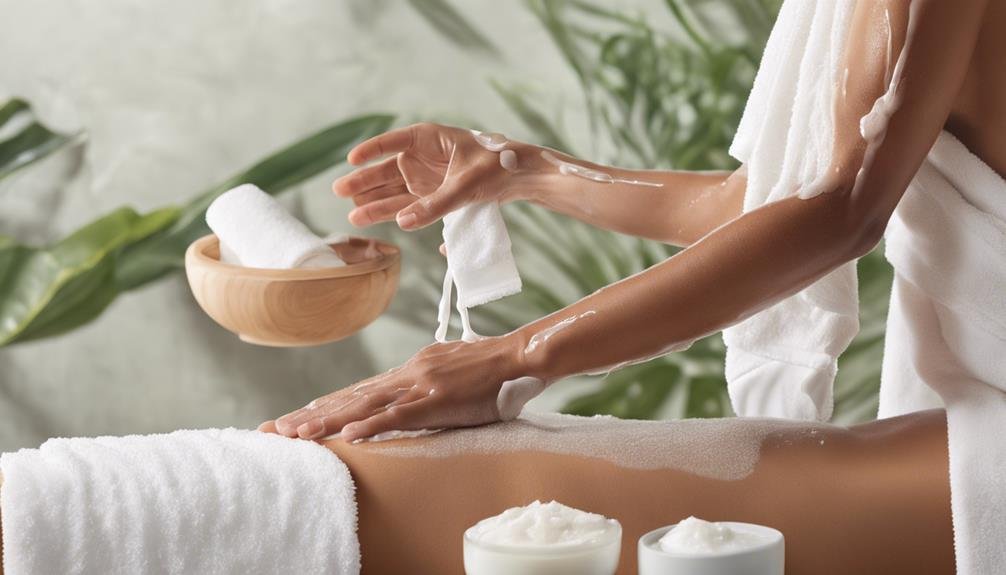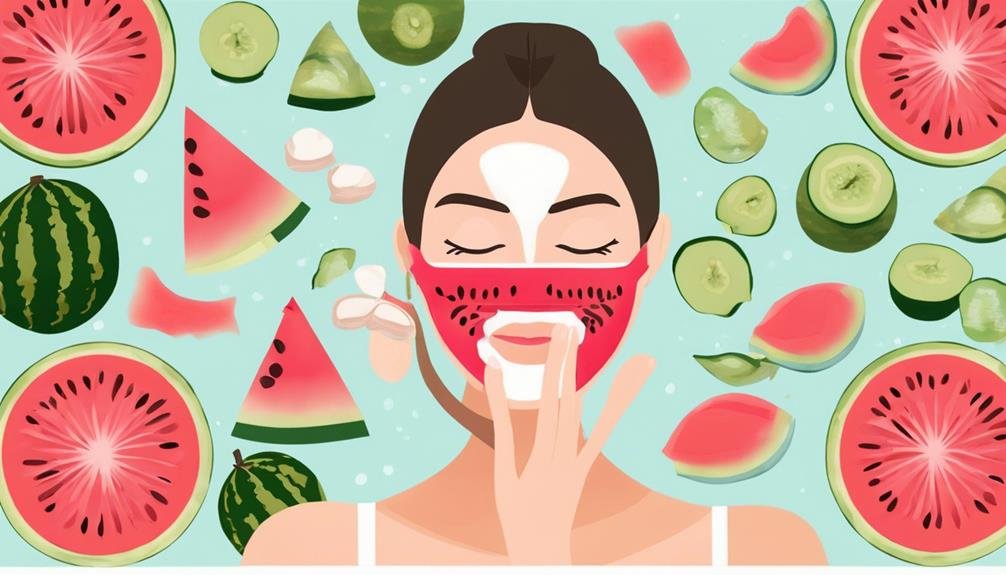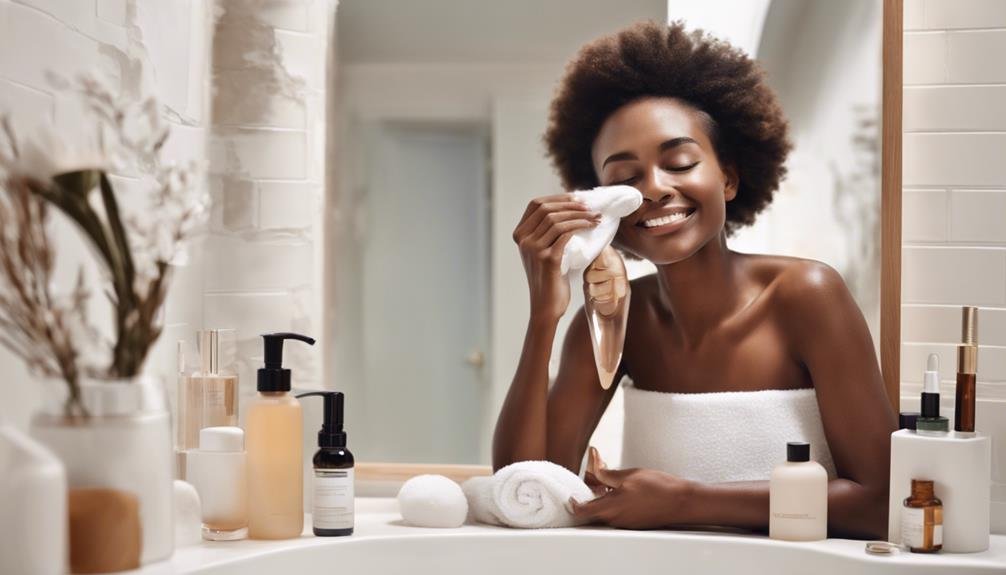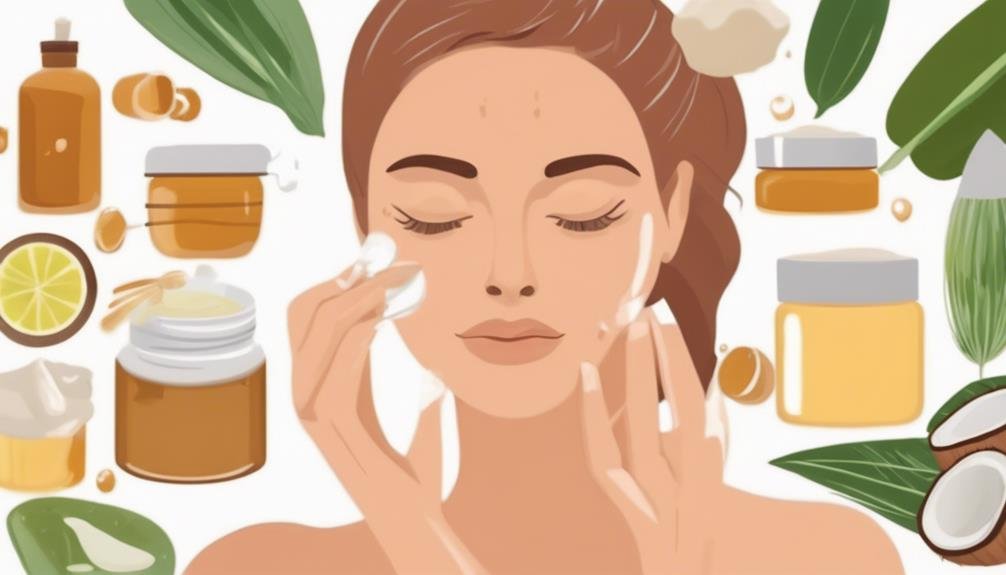"Cherishing Little Steps - A Haven for Baby and Family Journeys"
How to Maintain Healthy, Glowing Skin
To achieve that coveted healthy, glowing skin, you need to pay attention to some key factors. From cleansing to moisturizing, each step plays a vital role in your skincare routine. But there's one crucial aspect that often gets overlooked, a secret weapon of sorts, that can truly elevate your skin game to the next level. It's a step that goes beyond the surface and dives deep into the core of skin health, unlocking its full potential. Stay tuned to discover this game-changing element that will revolutionize your skincare regimen and leave you with radiant, luminous skin.
Key Takeaways
- Proper cleansing removes impurities for clear skin.
- Regular exfoliation unclogs pores and boosts radiance.
- Hydration with water and moisturizers promotes plumpness.
- Daily SPF application shields against premature aging.
- A balanced diet rich in nutrients supports skin health.
Cleansing

When it comes to maintaining healthy, glowing skin, cleansing plays a crucial role in your skincare routine. Cleansing helps remove dirt, oil, makeup, and other impurities that can clog pores and lead to breakouts. Choosing a gentle cleanser suited to your skin type is essential.
Whether you have dry, oily, combination, or sensitive skin, using the right cleanser ensures that your skin remains clean without stripping away essential moisture.
Make it a habit to cleanse your face twice a day, in the morning and evening, to keep your skin fresh and radiant. Use lukewarm water to wash your face, as hot water can be harsh and drying.
Gently massage the cleanser onto your skin in circular motions, then rinse thoroughly. Pat your face dry with a clean towel, avoiding harsh rubbing that can irritate the skin.
Exfoliation
Proper exfoliation is a key step in maintaining healthy, radiant skin. By removing dead skin cells, you unclog pores, prevent breakouts, and allow skincare products to penetrate more effectively.
There are two main types of exfoliation: physical and chemical. Physical exfoliants, like scrubs or brushes, physically slough off dead skin cells. Chemical exfoliants, such as AHAs or BHAs, dissolve the bonds between skin cells for a deeper exfoliation.
When exfoliating, be gentle and mindful of your skin type. Those with sensitive skin should opt for gentler exfoliants and limit exfoliating to once or twice a week, while oily skin types can exfoliate more frequently. Over-exfoliating can lead to irritation and damage your skin's moisture barrier, so listen to your skin's needs.
Incorporating exfoliation into your skincare routine 1-3 times a week can reveal smoother, brighter skin. Remember to follow up with sunscreen during the day to protect your newly revealed skin from sun damage.
Hydration

To maintain healthy, glowing skin, ensuring proper hydration is essential. Hydrated skin is plump, smooth, and radiant, while dehydrated skin can appear dull, dry, and more prone to wrinkles. Drinking an adequate amount of water daily is crucial, but topical hydration is also vital. Using moisturizers with ingredients like hyaluronic acid, glycerin, and ceramides can help lock in moisture and improve skin barrier function.
| Benefits of Hydration | How to Hydrate |
|---|---|
| Plump and radiant skin | Drink plenty of water throughout the day |
| Improved skin elasticity | Use a hydrating serum before moisturizer |
| Reduced appearance of wrinkles | Choose a moisturizer with humectants like hyaluronic acid |
| Enhanced skin barrier function | Incorporate hydrating face masks into your skincare routine |
| Soothes and calms irritated skin | Avoid harsh, drying ingredients in your skincare products |
Sun Protection
Protecting your skin from the sun's harmful rays is crucial for maintaining healthy, glowing skin. The sun's UV rays can cause premature aging, dark spots, and even skin cancer. To keep your skin safe and radiant, follow these sun protection tips:
- Apply sunscreen: Use a broad-spectrum sunscreen with at least SPF 30 every day, even on cloudy days.
- Seek shade: Limit direct sun exposure by sitting under an umbrella or wearing a wide-brimmed hat.
- Wear protective clothing: Opt for long sleeves, pants, and sunglasses with UV protection to shield your skin from the sun's rays.
Healthy Diet

Ensuring a nutrient-rich diet is essential for maintaining healthy, glowing skin. Your skin reflects what you eat, making a balanced diet crucial for skin health. Here are some skin-loving foods to include in your meals:
| Category | Foods | Benefits |
|---|---|---|
| Fruits | Berries, Oranges | Rich in antioxidants for skin repair |
| Vegetables | Spinach, Bell Peppers | Provides vitamins A, C, and E for skin health |
| Healthy Fats | Avocado, Nuts | Essential for maintaining skin elasticity |
| Protein | Salmon, Tofu | Aids in collagen production for skin strength |
| Water | N/A | Hydrates skin from within, promoting glow |
Adequate Sleep
Your skin's health isn't just about what you eat but also about how well you rest. Adequate sleep plays a vital role in maintaining healthy, glowing skin. When you prioritize quality rest, you give your skin the opportunity to rejuvenate and repair itself.
Here are three essential benefits of getting enough sleep for your skin:
- Enhanced Radiance: During deep sleep, your body boosts blood flow to the skin, providing it with essential nutrients and oxygen. This increased circulation contributes to a glowing complexion.
- Reduced Inflammation: Lack of sleep can lead to increased stress levels, triggering inflammation in the skin and exacerbating conditions like acne and eczema. Sufficient rest helps keep inflammation at bay, promoting clearer skin.
- Firmer Skin: Collagen production, crucial for skin elasticity and firmness, peaks during deep sleep. By ensuring you get enough rest, you support the body in maintaining youthful and firm skin.
Prioritizing adequate sleep is a simple yet powerful way to support your skin's health and achieve that coveted radiant glow.
Stress Management

Amidst the hustle and bustle of daily life, managing stress is paramount for maintaining healthy, glowing skin. When you're stressed, your body releases hormones like cortisol, which can lead to inflammation and breakouts on your skin. Finding effective ways to manage stress is crucial in your skincare routine.
One effective method to reduce stress is practicing mindfulness and deep breathing exercises. Taking a few minutes each day to breathe deeply and focus on the present moment can help lower cortisol levels and promote healthier skin.
Additionally, engaging in activities you enjoy, such as hobbies or spending time with loved ones, can be beneficial for reducing stress and improving your skin's appearance.
Regular Exercise
To maintain healthy, glowing skin, incorporating regular exercise into your routine is essential. Exercise not only benefits your overall health but also plays a significant role in enhancing the quality of your skin. When you work up a sweat, you're not just burning calories; you're also improving circulation, reducing inflammation, and promoting a natural glow.
Here are three ways regular exercise contributes to healthier skin:
- Increased Blood Flow: Engaging in physical activity boosts blood circulation, delivering essential nutrients and oxygen to your skin cells. This increased blood flow helps nourish skin cells and keep them healthy.
- Stress Reduction: Exercise is a powerful stress-reliever, lowering cortisol levels that can wreak havoc on your skin. By reducing stress, you can prevent breakouts and other skin issues caused by elevated stress levels.
- Detoxification: Sweating during exercise helps flush out toxins from your body, including those that can clog pores and lead to dull skin. Regular exercise promotes a natural detoxification process that can leave your skin looking clear and vibrant.
Skincare Routine

Elevate your skincare routine to the next level for radiant, healthy skin. Taking care of your skin involves more than just a quick cleanse; it's about creating a routine that pampers and shields your skin from the challenges it faces daily.
Start with a gentle cleanser tailored to your skin type. Cleansing helps remove impurities and prepares your skin for the next steps.
Follow up with a toner to balance your skin's pH levels and tighten pores. Adding a serum enriched with antioxidants can help combat free radicals and improve skin texture.
Don't forget to apply an eye cream to hydrate and reduce puffiness. Finish off with a moisturizer containing SPF during the day and a nourishing night cream in the evening.
Consistency is key, so aim to stick to your routine morning and night. By investing time in your skincare regimen, you're investing in healthier, glowing skin that radiates beauty inside and out.
Moisturizing
When it comes to achieving healthy, glowing skin, one essential step you shouldn't overlook is moisturizing. Properly hydrating your skin can make a significant difference in its appearance and overall health. Here are some key points to keep in mind when it comes to moisturizing:
- Choose the Right Moisturizer: Look for a moisturizer that suits your skin type, whether it's oily, dry, combination, or sensitive. Opt for non-comedogenic formulas to avoid clogging pores.
- Apply Moisturizer Correctly: After cleansing your face, gently pat it dry with a towel. Then, apply a pea-sized amount of moisturizer in upward strokes to help improve circulation and prevent premature sagging.
- Don't Forget Sunscreen: Some moisturizers come with built-in SPF, but if yours doesn't, make sure to apply sunscreen separately to protect your skin from harmful UV rays that can lead to premature aging and skin damage.
Avoiding Harsh Chemicals

Choosing skincare products free from harsh chemicals is crucial for maintaining the health and appearance of your skin. Harsh chemicals can strip your skin of its natural oils, leading to dryness, irritation, and even breakouts. When selecting skincare products, look for labels that indicate they're free from sulfates, parabens, phthalates, and artificial fragrances. These ingredients can be harsh and damaging to your skin over time.
Opt for gentle, natural alternatives like plant-based oils, hyaluronic acid, and botanical extracts. These ingredients not only nourish and hydrate your skin but also provide essential vitamins and antioxidants to promote a healthy complexion.
Additionally, consider products labeled as "non-comedogenic," which means they're less likely to clog pores and cause acne.
Professional Skincare Treatments
For optimal skin health and rejuvenation, professional skincare treatments offer advanced solutions tailored to address specific concerns and enhance your complexion. These treatments provide a targeted approach to improving the overall quality and appearance of your skin.
Here are three key benefits of incorporating professional skincare treatments into your routine:
- Customized Facials: Experience personalized facials that cater to your skin's unique needs, whether it's hydration, anti-aging, or acne treatment. Professional estheticians will assess your skin and recommend the most suitable treatments to achieve your desired results.
- Chemical Peels: Renew your skin's surface with chemical peels that exfoliate and stimulate cell turnover, revealing smoother and more radiant skin. These treatments can help reduce hyperpigmentation, fine lines, and improve overall skin texture.
- Microdermabrasion: Achieve a youthful glow by undergoing microdermabrasion, a non-invasive procedure that gently exfoliates the skin, minimizing the appearance of pores, fine lines, and uneven skin tone. This treatment promotes collagen production, resulting in firmer and more supple skin.
Frequently Asked Questions
Can Genetics Affect My Skin's Health and Appearance?
Genetics significantly impact your skin's health and appearance. Certain traits, like skin type, aging processes, and predispositions to conditions, are inherited. While genetics play a role, a good skincare routine can help maintain healthy, glowing skin.
How Does Pollution Impact Skin Health?
Pollution impacts skin health by increasing free radicals, leading to inflammation, premature aging, and skin damage. It clogs pores, triggers breakouts, and dulls your complexion. Protect your skin by cleansing thoroughly and using antioxidants and SPF daily.
Are Natural Skincare Products Better Than Synthetic Ones?
When it comes to skincare, natural products offer benefits that synthetic ones may lack. They are often gentler on the skin, free from harsh chemicals, and can provide nourishment from plant-based ingredients.
Can Hormonal Changes Affect My Skin?
Hormonal changes can significantly impact your skin. Fluctuations in hormones can lead to increased oil production, breakouts, and uneven skin tone. It's essential to understand how these changes affect your skin to address any concerns effectively.
What Role Does Age Play in Skincare Routines?
As you age, your skin changes. Adjust your skincare routine to meet evolving needs. Consider incorporating products targeting mature skin concerns like fine lines, wrinkles, and loss of elasticity. Prioritize hydration and protection.
Conclusion
Incorporating a consistent skincare routine is key to maintaining healthy, glowing skin. Did you know that over 90% of premature aging is caused by sun exposure? By protecting your skin from harmful UV rays with daily sunscreen application, you can prevent premature aging and maintain a youthful complexion. Remember to cleanse, exfoliate, hydrate, and nourish your skin to achieve that radiant glow you desire. Take care of your skin, and it will thank you in the long run.

